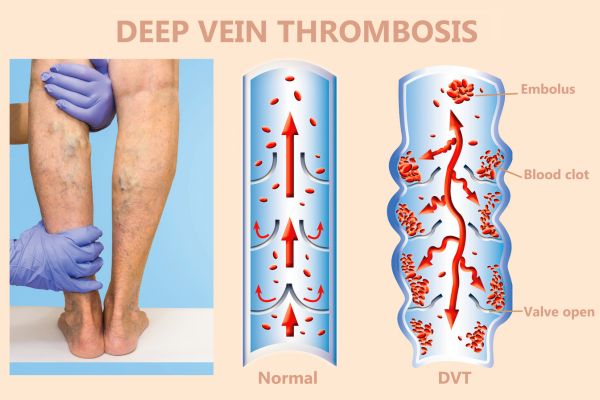
Deep vein thrombosis (DVT) occurs when a blood clot, or thrombus, forms in one of the deep veins of your body. It often affects the veins in the legs but can also occur in the pelvis, arms or other areas.
The main concern with DVT is the possibility of the clot breaking loose and traveling through the bloodstream, leading to a life-threatening condition called pulmonary embolism.
Causes and risk factors for DVT
Some common causes and risk factors for DVT include prolonged immobility, surgery or trauma, medical conditions such as cancer or heart disease, pregnancy and childbirth or an inherited or acquired blood-clotting disorder.
Symptoms and complications of DVT
DVT may not always present noticeable symptoms, but common signs include:
- Swelling in the affected leg, often accompanied by unexplained pain, cramping or tenderness
- Warmth and redness over the affected area
- Dilated surface veins
If a blood clot breaks loose and travels to the lungs, it can cause a life-threatening pulmonary embolism. Symptoms of a pulmonary embolism may include sudden shortness of breath, chest pain, rapid heartbeat, dizziness and coughing up blood.
Diagnosis and treatment
If DVT is suspected, a doctor may perform diagnostic tests, including an ultrasound of the affected area or a D-Dimer test to measure a substance in your blood that can indicate a clot. Treatment for DVT focuses on preventing the clot from getting larger and reducing the risk of pulmonary embolism. Common treatments include:
- Blood-thinning medications like heparin or warfarin — often prescribed to prevent clot growth and new clot formation
- Thrombolytic therapy, or using medications also known as “clot busters,” to dissolve the clot more quickly
- Filters, which may be placed into a large vein — the vena cava — in your abdomen when medicines aren’t an option
- Compression stockings to help prevent swelling and promote blood flow in the legs.
Preventing DVTs
Preventing DVT is crucial, especially if you have any of the known risk factors listed above. Some preventive measures include moving, stretching and exercising regularly to improve blood circulation, maintaining a healthy weight, avoiding smoking, limiting alcohol and wearing compression stockings.
If you think you have DVT, seek the care of a vascular specialist immediately or go to the nearest emergency department.